Blog
The Best Music Distribution Platforms for Music Producers in 2025
14 May '2025
Deciding which music distributor is right for you can be tricky, especially when there are so many out there. Let us help by breaking down the pros and cons

Image by Sanket Mishra on Pexels
Is Tunecore better than CD Baby? What other options are out there? If you’re looking for the top-trump, best music distributor to serve your needs as an indie artist, we’ll be taking a dive into each of the most prominent providers out there.
Even if you’re just starting out and searching for how to get your music on Spotify or to get music on Apple Music, after this read, you’ll have the answers you seek. We’ll be listing each of the best music distributors with a neat breakdown of their most appealing pros, as well as their somewhat problematic cons.
Before we jump in, if you find this article useful, feel free to check out our Loopcloud in Under One Minute article afterward. We hope you’ll be glad to make our acquaintance.
1. AmpSuite
Best for all-in-one record label management and extra features

AmpSuite has been designed as an in-your-pocket record label personal assistant. So, aside from allowing you to get your music onto Spotify, Apple Music, Deezer, Tidal and all other major streaming and digital download platforms, AmpSuite will provide you with much more.
In the modern world, being an artist is becoming more and more of an independently-run hustle. That means we don’t particularly need to rely on major record labels for our success and management as musicians. However, the downside to this is that we’re solely responsible for the job roles and multi-faceted departments that a record label would typically employ.
That’s where AmpSuite really shines, offering modifiable contract templates, in-depth royalty accounting and much more under one service, all accessible in your pocket from a phone app. If you’d like a full breakdown of AmpSuite and how it can save you a bunch of time and hassle, read more about it here.
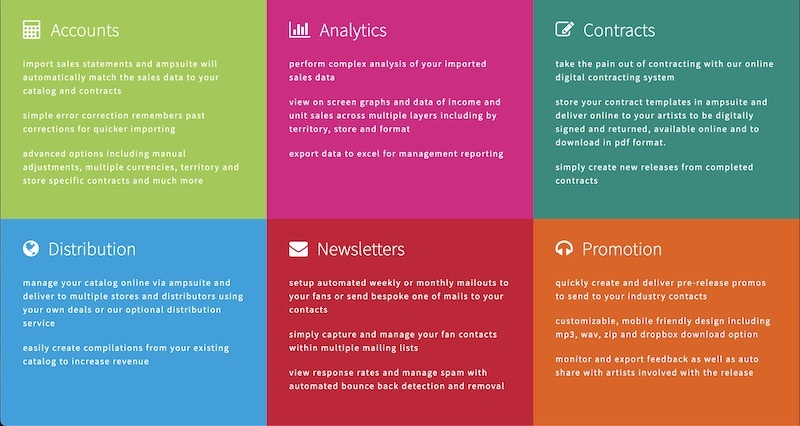
Pros for AmpSuite
- Much more than a mere distribution service
- Modifiable contract templates
- Manage a whole roster of artists
- Promo emails & press releases
- Live feedback
- Advanced royalty accounting
- Sales analytics
- Social media tools
Cons for AmpSuite
- Currently only accessible through a requested demo
2. DistroKid
Best for simplistic indie artist distribution and promo tools

DistroKid has been one of the top-rated distribution platforms for independent artists for a while. That’s because you can’t really fault it too heavily. Sure, it doesn’t come pre-packed with as many bonus features as some of its contemporaries, but, if you’re a lone-wolf artist, it surely provides all you’ll need at an affordable price.
A couple of neat features DistroKid does have going for it is its instantaneous social media promo content creation, as well as the ability to capitalise your album/single titles. Yes, DistroKid is hip with the times, as it has an array of meme-like templates for your Instagram and other social pages, that you can quickly apply your release details to and promote across the web.
The creativity that comes with formatting song/album titles in interesting ways might be a big deal for some artists. We’ve seen artists like Kendrick Lamar use all caps characters on his album DAMN., as well as Billie Eilish do the same on her 2024 release, HIT ME HARD AND SOFT. Some artists even use special characters in their titles (like +, < and ^). DistroKid will allow you to do the same, whereas a platform like Tunecore seems to be very sensitive to cases and grammar.
Pros for DistroKid
- Affordable prices at all tiers
- High-quality social media content promo
- Song/album title capitalisation
- Minimalistic interface
- Fast customer support responses
Cons for DistroKid
- No publishing service
- Minimal management tools
- Weak for multi-artist management
3. Tunecore
Best for independent publishing management and professional overview

One of the things we will say when comparing Tunecore to Distrokid is that DistroKid can feel quite amateur in comparison. When you step into Tunecore’s online portal, it feels like a polished, professional hub for overseeing all of your musical endeavours.
Its strongest point is its optional publishing add-on, which you can acquire additionally to your annual subscription via a one-time payment. Once secured, Tunecore will manage all of your music publishing with the necessary royalty collection societies. Sure, they take a small commission, but that’s pretty standard with any publishing deal, and it sure saves a big headache for independent artists.
Aside from that, Tunecore offers increasing abundances of value with each of their subscription tier packages. They also have a great track record for customer support. One last thing to mention is that they have an included insurance policy for your music to keep your releases live in stores if your payment method happens to be declined, or something goes wrong. With most other DDPs, they won’t be as forgiving.
Pros for Tunecore
- One-time-payment publishing deal
- Excellent customer service
- Extra value at each subscription tier
- Well-designed web portal
- Intuitive royalty splitting
- Extensive analytic data
Cons for Tunecore
- No song/album title capitalisation
- Quite pricey
- Not as many promo tools
4. Ditto Music
Best for multi-artist management
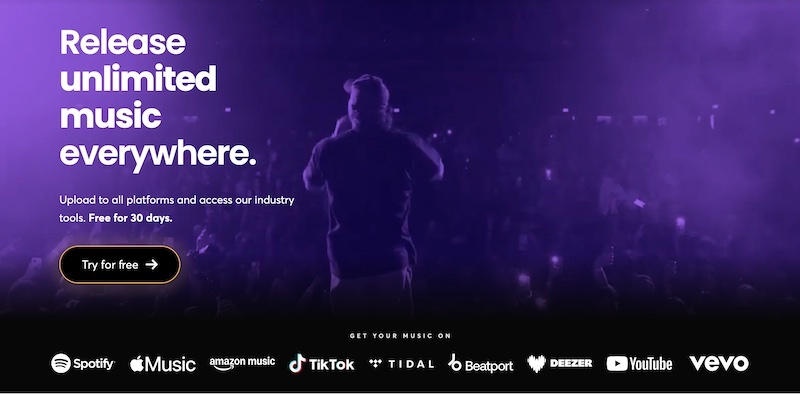
If you’re working with a team of artists and producers, Ditto Music could be the ideal DDP choice for you. It has a pretty comprehensive web portal with a myriad of record label management services. So, whether you’re a one-man army, a two-man team, or a 30+ squadron, Ditto has a range of subscription tiers to fit your needs. Although, they definitely stand out with their multi-artist options.
Another few more positive things to mention about Ditto Music is that they offer a publishing deal–like Tunecore, they have optional official music charts registration per release, as well as an optional VEVO music video channel, which will distribute music videos across many platforms and media outlets. Also, their release management portal and royalty/analytics pages are minimalistic in design, whilst providing in-depth data.
One significant downside to Ditto is that you’ll have a hard time getting in touch with their customer support. They typically take a while to respond, and the only way to get in touch is by submitting a support ticket. So, if you need urgent assistance, you can forget about it. They also typically don’t check your releases for approval until the last minute, so if your release gets rejected for some reason, you’ll have no time to fix the issue.
Pros for Ditto Music
- Official chart registration
- Optional VEVO music channel
- Extensive record label overview
- Intuitive release performance analytics
- Optional music publishing
- Optional premium promo campaign packages
Cons for Ditto Music
- Suboptimal customer support
- Delayed track approval
- High-priced promo and upper-range tiers
5. UnitedMasters
Best for getting started as an independent artist
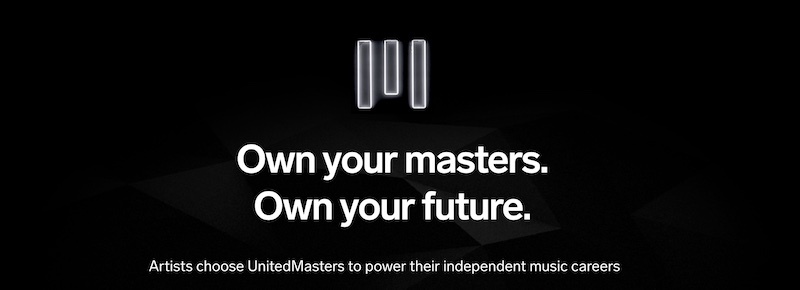
UnitedMasters is a bit of a controversial entrant in this list. Overall, its users mostly report negative feedback with customer support and unexplained account deactivations. However, a minority of artists do praise UnitedMasters for its promotional tools and ease of use.
The top thing that UnitedMasters does stand on its own accord with is its completely free-to-use starting basis. That’s right… Unlike any of its competitors, UnitedMasters allows you to distribute your music to all major streaming and digital download platforms for free, as long as they take a 10% commission of any future earnings. This can be an extremely appealing term for beginners on a budget.
Additionally, UnitedMasters have managed to secure some of its most esteemed and loyal users with significant music sync deals, getting their songs featured on television and at NBA basketball games, due to their ongoing sponsorship with the brand. So, it’s up to you to weigh up the potential risk for reward here.
Pros for UnitedMasters
- Free to use with 10% commission
- Exclusive sync and licensing deals
- Ability to climb the ranks and land VIP partnership
- Rewards you for loyalty
Cons for UnitedMasters
- Overall negative user feedback
- Limited tools
- Favoured treatment of esteemed artists
- Only 50+ platform distribution
6. CD Baby
Best for ensuring your musical legacy remains on the market
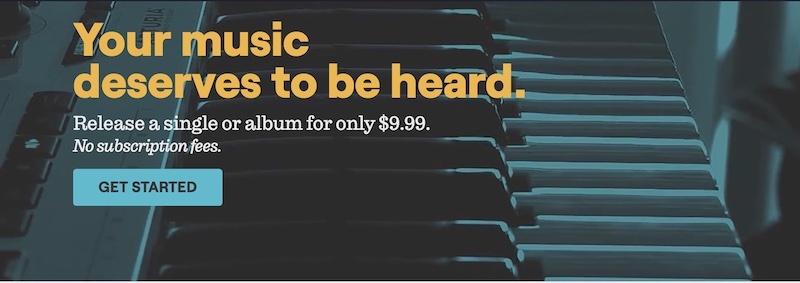
This distribution company brings a slightly different approach to their model that potentially might attract or repel you, depending on your stance. CD Baby doesn't follow the subscription-based payment system that the vast majority implement. Rather, CD Baby requires a $9.99 one-time fee per track with a 9% commission fee for life.
At first glance, that might seem like a steep price, especially if you’re an indie artist on a budget and unlikely to see a return on your initial releases. But, there’s a method to the CD Baby madness. The reason they opt for this model is because it ensures your releases will stay live on platforms for eternity once you make that payment. You require no further upkeep with the intermediary company afterward. This can be a beneficial thing for you if you’re already generating income and guaranteed to recoup the $9.99 upfront cost per track.
Another couple significant unique features to CD Baby is that the platform offers physical distribution options, as well as the chance to get licenses for cover song releases. That could be a huge advantage for those of you who regularly cover other artists’ works.
Pros for CD Baby
- One-time, no-nonsense fee per track
- Cover song licensing
- Physical distribution options
- Tracks stay up forever
Cons for CD Baby
- 9% lifetime commission
- Limited tools
- Reported slow customer service
7. AWAL (Artists Without A Label)
Best for showcasing talent that already has momentum

If you’re an underground artist that has already generated a bit of a buzz around your name, AWAL could be the go-to choice for you. That’s because they typically don’t allow any randomer to sign up and use their services. Rather, they tailor their services to really make a difference in the careers of their users. However, you’ll have to go through the application process and prove your worth.
With that being said, if you do get a partnership with AWAL, you’re sure to reap some very real benefits and special treatment from the staff, as they’ll take a great deal of weight off your shoulders and provide you with many traditional record-label-like services, including sync deals, advanced analytics, marketing campaign support, and potential funding opportunities.
Essentially, if you already have a bit of momentum, AWAL will take you under their wing and act as a great middle man, not just a regular DDP provider. But, if you don’t fit the bill, you’ll have to establish yourself first before gaining access.
Pros for AWAL
- Premium VIP treatment
- Advanced services with extensive support
- Marketing campaign support
- Funding opportunities
- Record-label-like services
- No upfront fees
Cons for AWAL
- Selective applicant basis
- 15% commission rates
8. SoundCloud
Best for optimising paid platforms with free-to-use platforms
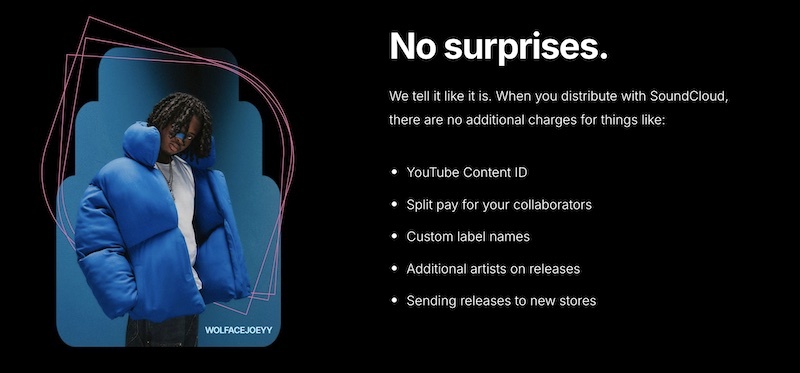
If you haven’t heard the name SoundCloud, you’ve most definitely been living under a rock and should probably catch yourself up to speed ASAP. SoundCloud became globally known as the most popular free-to-use music streaming platform, and was responsible for breaking through numerous elite artists over the last 10+ years.
Well, the management of SoundCloud have worked hard to keep up with the times and adjust their business model to continue providing great value to their users. They introduced an Artists Pro plan, where users can pay a monthly or annual fee to gain advanced insights into their streaming analytics, distribute to all the major globally-leading paid streaming platforms, as well as a whole other swathe of resources you can see for yourself here.
Essentially, if you’re already a SoundCloud user, or you want to prioritise giving your fans free-to-use access to your music, as well as cater to the paying audiences across Spotify, Tidal, Apple Music, Deezer and more, then opting in to the SoundCloud premium service could be the best option. After all, you can manage all of your analytics and resources under the one SoundCloud hood, saving time elsewhere on the net. Plus, the services you get are pretty top-tier, we must say, even if they do come in at a hefty price.
Pros for SoundCloud
- Advanced analytics
- AI-powered mastering
- Priority SoundCloud customer support
- Direct fan engagement
- Social promotion tools
- Convenient for pre-existing SoundCloud users
Cons for SoundCloud
- $99 per year fee
- Not much multi-artist support
- Mixed reviews across the web
Further Reading
We hope you feel at least a little more educated on digital distribution platforms as a whole, and are well equipped to make the right decision for your career moving forward.
If you’re looking to get started with a distribution platform, it’s likely you’re at the beginning stages of your music career. If that’s the case, why not check out this quick Musical Terms Every Producer Should Know glossary to fasttrack your way to becoming a professional?

